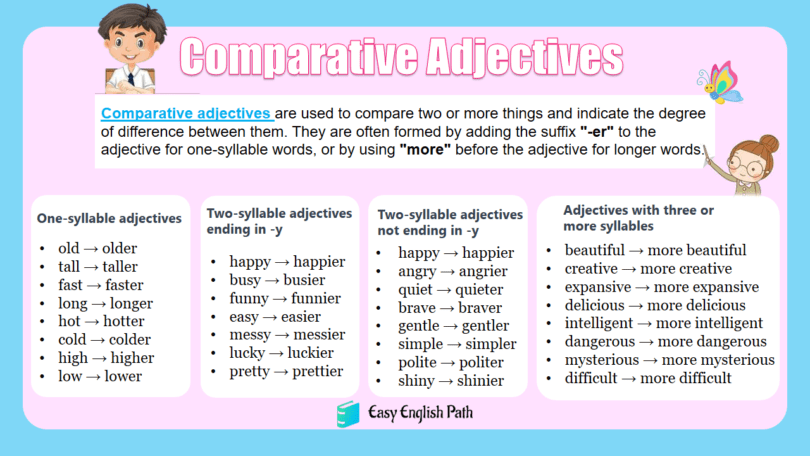Comparative adjectives, like ‘your’ and ‘his,’ show who owns something. This blog explains these words with simple examples, making it easy for beginners. Learning about comparative adjectives helps you write better sentences and improve your English.
What is a Comparative Adjective?
A comparative adjective is used to compare two things. If the adjective is one syllable, add -er (e.g., smaller, faster). If it has two or more syllables, use more or less before it (e.g., more beautiful, less expensive).
- The elephant is bigger than the mouse.
- The weather today is worse than yesterday.
- The store is farther/further away than I thought.
Types of Comparative Adjective
- Regular Comparative Adjectives
- Irregular Comparative Adjectives
- One-Syllable and Two-Syllable Adjectives
- Adjectives with Two or More Syllables
- Adjectives with Three or More Syllables
1. Regular Comparative Adjectives
Regular comparative adjectives are formed by adding the suffix -er to short adjectives or by using the word more before longer adjectives.
- She runs faster than him.
- John is taller than his sister.
2. Irregular Comparative Adjectives
Irregular comparative adjectives do not follow the general pattern of adding -er or more to form the comparative degree. Instead, they have unique comparative forms.
- Yesterday’s weather was bad, but today’s is worse.
- The store is farther/further away than I expected.
3. One-Syllable and Two-Syllable Adjectives:
These adjectives consist of a single syllable. They are typically short and often describe basic qualities. When forming the comparative and superlative forms of one-syllable adjectives, we usually add -er for the comparative and -est for the superlative.
- Tall → Taller (Comparative) → Tallest (Superlative)
- Fast → Faster (Comparative) → Fastest (Superlative)
4. Two-Syllable Adjectives:
These adjectives have two syllables. Forming their comparative and superlative forms can vary. For many two-syllable adjectives, especially those ending in -y, -le, -er, and -ow, we often add -er for the comparative and –est for the superlative. For others, we use more and most instead.
- Happy → Happier (Comparative) → Happiest (Superlative)
- Simple → Simpler (Comparative) → Simplest (Superlative)
- Narrow → Narrower (Comparative) → Narrowest (Superlative)
5. Adjectives with Two or More Syllables
Adjectives with two or more syllables often form their comparative degree by using the word more before the adjective.
- The sunset is more beautiful than the sunrise.
- The new sofa is more comfortable than the old one.
6. Adjectives with Three or More Syllables
Adjectives with three or more syllables often use more in the comparative form.
Important
- Comparative: More important
- Example: This project is more important than the previous one.
Delicious
- Comparative: More delicious
- Example: The homemade cake is more delicious than the store-bought one.

Comparative Adjectives Examples:
- The mountain trail is narrower than the wide forest path.
- Her laptop is more expensive than mine.
- This novel is more interesting than the one I read last week.
- Winter days are shorter than summer days.
- The cheetah is known for being the world’s fastest land animal.
- Learning a new language can be more challenging than expected.
- The red dress looks better on you than the blue one.
- His explanation was clearer than the teacher’s.
- This hotel is more comfortable than the last one we stayed at.
- The new smartphone is lighter than the previous model.
- Common Mistakes with Comparative Adjectives
Common Mistakes Comparative Adjectives
1. Using “more” with -er adjectives
❌ This road is more narrower than the other one.
✔️ This road is narrower than the other one.
2. Not using ‘than’ when comparing
❌This book is better the other one.
✔️This book is better than the other one.
3. Using double comparatives
❌She is more taller than her brother.
✔️She is taller than her brother.
4. Using comparative instead of superlative
❌ This is the better movie I’ve ever watched.
✔️This is the best movie I’ve ever watched.
5. Using ‘most’ instead of ‘more’
❌ This dress is most beautiful than that one.
✔️ This dress is more beautiful than that one.
FAQs on Comparative Adjectives
1. What is a comparative adjective?
A comparative adjective is used to compare two things, showing differences in quality, size, or degree (e.g., bigger, more expensive).
2. How do you form comparative adjectives?
For short adjectives, add -er (e.g., taller, faster). For longer adjectives, use more or less (e.g., more beautiful, less interesting).
3. What is the difference between comparative and superlative adjectives?
Comparative adjectives compare two things (e.g., smarter), while superlative adjectives compare three or more (e.g., smartest).
4. Are there irregular comparative adjectives?
Yes, some adjectives don’t follow the usual rules, like good → better, bad → worse, and far → farther/further.
5. Can we use double comparatives?
No, it’s incorrect to say more faster or most easiest. Use either faster or more easy (easier) correctly.
You May Also Like





